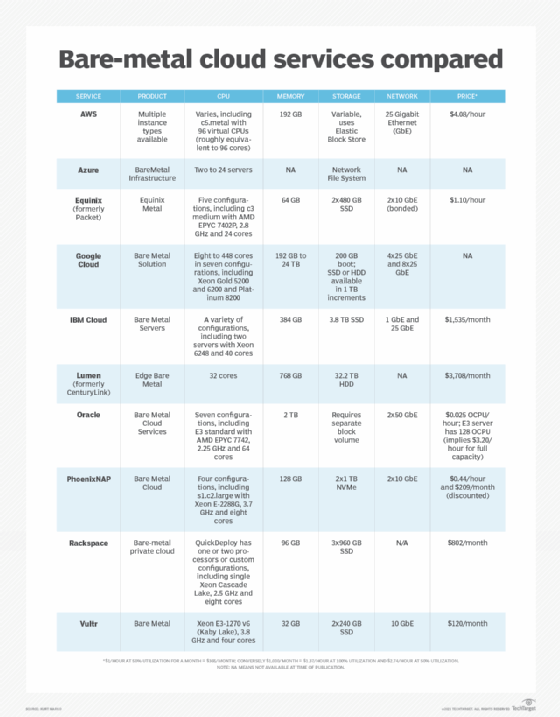bare-metal cloud
What is bare-metal cloud?
Bare-metal cloud is a public cloud service where the customer rents dedicated hardware resources from a remote service provider. It offers the hardware resources without any installed operating systems or virtualization infrastructure.
Commercial cloud service infrastructure enables the virtualization and subdivision of compute, storage and database resources so that servers and storage arrays can be carved up and shared by multiple customers. But while virtualized compute instances provide flexibility and cost benefits, there are drawbacks, particularly related to resource contention -- the so-called noisy neighbor problem. There are also risks from incomplete isolation of execution environments and virtual networks. Bare-metal cloud solves these issues, allocating isolated physical resources to customers.
The bare-metal-cloud is a good option for big data applications and high-transaction workloads that do not deal well with latency. Most of the largest cloud vendors, such as AWS, IBM, Oracle and Rackspace, offer bare-metal cloud services.
How do bare-metal clouds work?
Bare-metal services are cloud offerings that are comparable to renting a raw, dedicated server from a managed service provider (MSP). Like traditional dedicated servers, bare-metal instances are not preinstalled with a hypervisor and provide raw access to the system hardware. Unlike traditional dedicated servers, some bare-metal instances are available on demand and billed by a specific time period.
Large cloud providers, such as AWS, may offer additional hardware to enhance conventional servers and improve their integration with virtual private cloud networks, cloud management systems and other cloud services. For instance, AWS bare-metal instances are actually pseudo-bare-metal machines; they include a lightweight Nitro hypervisor that manages memory and CPU allocation. (AWS claims the hypervisor overhead is negligible and server performance is indistinguishable from bare metal for most workloads.) Similarly, Oracle Cloud Infrastructure bare-metal servers operate within a virtual cloud network and use a custom SmartNIC to isolate and virtualize the network.
Like dedicated servers, bare-metal clouds don't share system resources with other users. They also don't have added overhead from nested virtualization when a user adds a separate virtualization layer; for example, when containers are run within a lightweight virtual machine (VM). Bare-metal servers are ideal for applications that require access to the physical server hardware and performance counters or that are licensed and supported for virtualized environments.
Bare-metal servers are accessed via the cloud service's management interfaces, which might be a browser interface, command-line interface or REST API. Some services might also enable Secure Shell access over a customer's virtual private cloud to the serial console for systems that have already have a running operating system. OS installs are accomplished using the Unified Extensible Firmware Interface or the Preboot Execution Environment secure network boot of an installation image.
Benefits and drawbacks of bare-metal cloud
There are both benefits and drawbacks related to a bare-metal cloud environment. It's important to examine them carefully before deploying one.
Benefits
- Predictability. One benefit of bare-metal cloud infrastructure is the performance predictability of dedicated resources.
- Security. Dedicated resources also provide customers with control of system and network security.
- Flexibility. Businesses can customize a bare-metal cloud to meet their OS and software stack requirements and troubleshoot applications without having to worry about neighboring VMs.
- No resource contention. Public cloud environments are multi-tenant and VMs share physical servers, which can result in VMs contending for resources. The dedicated servers that make up a bare-metal cloud avoid resource contention.
- Scalable. Thus, most bare-metal services are highly scalable, including systems with more than 20 sockets, hundreds of CPU cores and terabytes of memory. That makes them good options for big data applications and high-transaction workloads that need low latency.
- Direct access to system hardware. Bare metal allows applications requiring access to system performance counters to run in a cloud environment.
- Financing flexibility. Storage and other hardware resources are provisioned as needed and typically billed based on a specific time period -- per hour, day or month, eliminating the need to tie up Capex budget. This approach is particularly valuable for workloads where hardware requirements are unclear and likely to change.
- Access to high-end hardware. Customers get this access sometimes before it is available in enterprise systems.
- Cloud migration advantages. Bare metal enables the use of cloud migration software not supported on a VM or with restrictive, hardware-based licensing.
Drawbacks
- Added management overhead. Customer must configure all hardware and is responsible for installing and managing the OS, hypervisor, container stack and all software.
- Application performance bottlenecks. These problems may arise due to network and storage throughput and latency issues.
- Added costs. Some services require monthly leases resulting in paying for underutilized resources with bursty or nonsustained workloads. And bare metal might be more expensive for sustained, predictable workloads that can amortize a server's cost over three or more years.
- Limited options. Aside from AWS and IBM Cloud, most vendors have a limited selection of bare-metal systems with some configurations unavailable in particular cloud regions.
- Security vulnerabilities. Cloud vendors may do a better job configuring, monitoring and patching systems for security threats.
- Legacy software issues. Legacy software often has strict hardware compatibility requirements that might not include the available bare-metal configurations. For example, it could take months for a cloud vendor to certify its compute services for complex products like SAP HANA.
Bare-metal cloud vs. other types of cloud services
Bare-metal cloud services are alternatives to the more common virtual instances. However, with the variety of cloud instance types and billing models available, other alternatives might provide some of the advantages of bare metal without the drawbacks.
Related cloud services to consider when evaluating bare-metal servers include:
Conventional compute instances
Examples of these include AWS EC2, Azure Virtual Machines and Google Compute Engine. They come in various configurations, such as:
- general-purpose
- memory-optimized
- compute-optimized
- storage-optimized
- GPU-accelerated
- burstable
- preemptable
Compute instances
These come in different pricing and availability models, such as:
- on-demand, which is the most common type, typically priced by the hour, minute or second;
- spot or preemptable, which uses excess cloud capacity for short durations and can be temporarily suspended in return for significant discounts;
- reserved instance, which provides a price discount for a one- to three-year commitment;
- dedicated hosts where an entire server is assigned to one customer and carved into separate VM instances. These are similar to bare-metal instances in providing the resource predictability and security of a dedicated machine with the convenience of an on-demand VM instance.
Note that some bare-metal services do not include a local disk, and a separately configured block volume such as Amazon Elastic Block Store must be attached. Databases are a popular use of bare-metal servers, but every cloud service has an array of database services -- including RDBMS, NoSQL, key-value column store, caching and graph -- that might work as well or better than installing and managing traditional database software.
Bare-metal cloud vs. infrastructure as a service (IaaS)
Bare-metal services from the large cloud providers aren't alternatives to traditional IaaS products. But, by integrating bare-metal and conventional VMs in their compute service lineup, cloud operators make it simple for workloads running on bare metal to access cloud database, analytics, AI, machine learning and DevOps services.
For smaller service providers that lack the service portfolio of an AWS or Azure, bare-metal servers are little more than dedicated hosts and not a type of cloud offering.

How to choose a bare-metal cloud provider
Bare-metal cloud services include a range of performance and price options. Some vendors, such as Google Cloud and Oracle, focus on high-end configurations designed for databases and high-performance computing applications. Smaller vendors like PhoenixNAP and Vultr offer modest machines appropriate for developers and engineering workstations.
An organization's application requirements and reasons for choosing bare-metal cloud services over VM instances should be the primary considerations when evaluating bare-metal services. Other factors include:
- Existing relationships with cloud vendors. Organizations should consider the options available from the cloud platforms they are already using for other workloads.
- Workload characteristics. Workloads should be examined to see if they are variable or consistent and periodic or continuous. These properties will determine the most economical billing model, whether it is on-demand or by-the-minute, hour or month.
- Availability and price. Check out these factors for supplementary storage, container, database, machine learning, security, identity and access management and DevOps services. Most organizations should not move a bare-metal workload to the cloud unless they intend to incorporate other infrastructure and application services or integrate bare-metal systems with other enterprise workloads that have been migrated to the cloud.
- IT staff availability and expertise. Staff capabilities are required to run cloud environments and ensure server and network security. Bare-metal cloud servers require users to set up and maintain system configuration and security settings. Organizations that don't have the requisite experience to properly maintain a cloud server may face security and reliability risks when choosing bare-metal servers.
Bare-metal services are just one of many services cloud service providers offer. Learn more about the top public cloud service providers.






